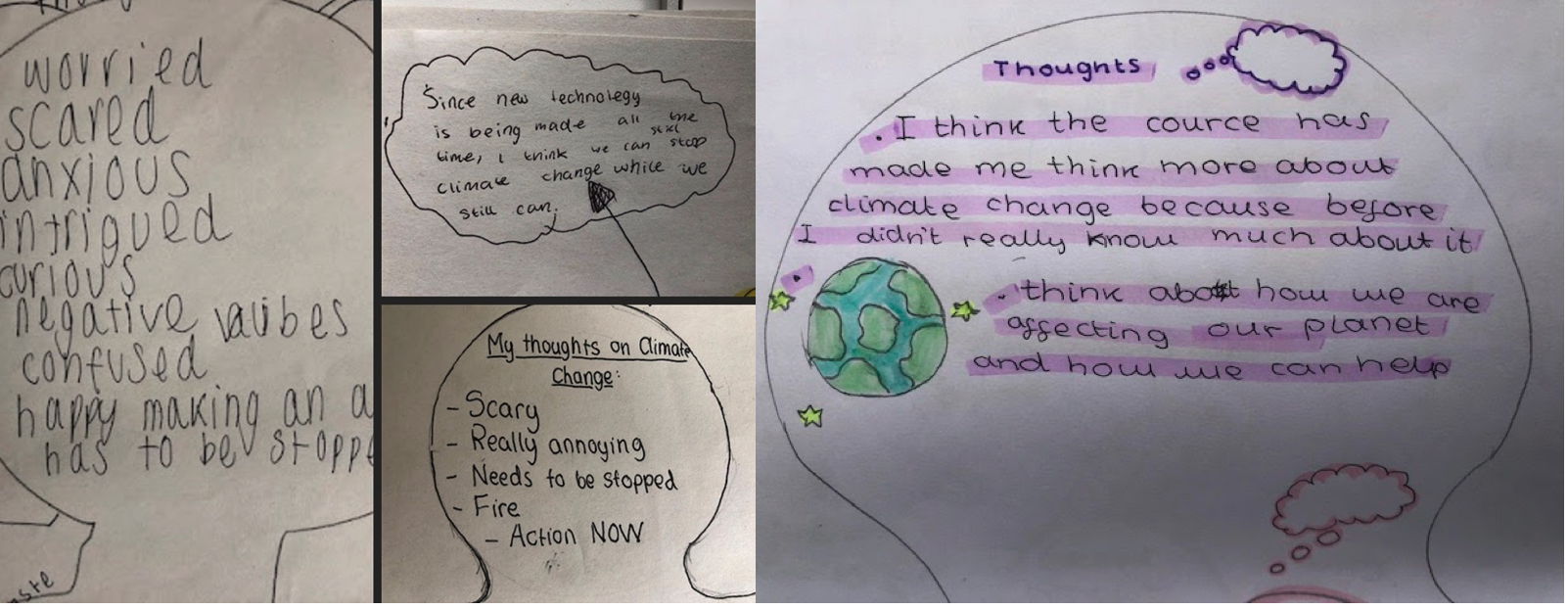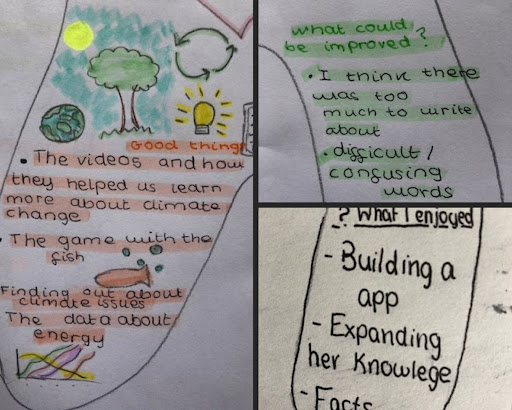How we’re empowering a generation of climate changemakers
There’s no bigger challenge young people will inherit than climate change - a challenge which schools currently feel ill-equipped to teach on their own. While many young people lack the skills they need to succeed in life, we bring together industry and educators to engage young people, from all backgrounds, in solving real world challenges. That’s why, in 2021 we began to pilot our new technology course - ‘Innovate for Climate Change’, which combines knowledge building with tech innovation skills, focused around the climate challenges young people care about.
With learning and social impact at the core of our approach, we worked with schools to test, refine and improve the course to ensure it delivers maximum value to students and teachers. The good news is, early feedback shows the course is having a positive impact on students because they feel engaged in creating change; some of the anxiety students feel about climate change is easing by understanding how they can make a difference and many students are feeling more empowered to act.
Our approach
Over a 6 month period, we trained 11 secondary school teachers to deliver the course and reached 258 young people (aged 12 and 13), of which 64% were girls and 75% were from schools in challenging circumstances*. With the support of our Impact and Evaluation Consultant, Dr. Jami Dixon, we used a variety of qualitative and quantitative methods to capture feedback from students and teachers. We used short end of lesson student online questionnaires to help us understand what they were enjoying and where we needed to make changes. We then used semi-structured interviews with teachers and students to explore key themes in more detail. Finally, we conducted two student focus groups and analysed some of their work to build a sense of what students had gained from the course.
What we learnt
We’re really encouraged that overall we’ve received positive feedback from students in all of the schools - 85% of students feel more knowledgeable about climate change as a result of the course.
We know that climate anxiety is a big cause of anxiety for young people and that many feel disempowered to act. Climate education doesn’t always focus on positive actions, so our intention to create a computing course that gets young people thinking about climate change and how they can use technology to help solve it, is paying off. Our initial findings show they are feeling more optimistic and empowered to act as a result and this is something we want to explore further as we roll-out the course to more schools.
I still think climate change is a major issue but the course has made me feel a lot more hopeful.”
Student focus groups helped us understand why some have mixed feelings about climate change - they feel like there is still a lot out of their control and they are concerned about inaction. To address this we have made some changes to the course to have even more focus on how technology can help us act on climate change and also created opportunities earlier in the course for students to start generating their own ideas for action.
Here are some of the students’ thoughts and feelings:

Teachers have welcomed the integration of climate change education into the computing curriculum, even enjoying learning more about climate change themselves - an area of teaching where they feel support is lacking. Some have a new perspective on climate change and have even shared the course's resources with other teachers in the school. They also report positive engagement from students, which is pleasing to hear.
Interest in the topic is good and has allowed students to do their own research and work independently….it's about the students being empowered to work on their own projects, owning their experiences and owning their own success and their failure”
Of course - there is room for improvement and our Senior Learning Manager, Dr Emma Posey has been focused on incorporating valuable feedback from students and teachers into the next iteration of the course, which will be available to all schools from September 2022. This has involved better integrating understanding of climate change alongside developing skills in computing ; scaffolding the learning to reduce the cognitive load of learning new terms; strengthening programming knowledge; building in more digital and interactive content to reduce the volume of written work, and providing additional support tools for teachers to help build confidence with the subject area.
An example of feedback and recommendations received from students.

At Apps for Good, it’s important to us to reach all young people and that our courses are accessible to everyone. Consequently, we have focused our energy on drawing on different teaching approaches to help young people positively approach issues around climate change, for example young people producing ideas and programmes together, introducing the concept of ‘pair programming’ and 'design thinking'.
Through Innovate for Climate Change, not only do we want young people to develop computing skills and learn how they can act on climate change - we also want them to develop the ‘essential skills’ they’ll need for future careers. For example creativity, problem-solving, staying positive and teamwork. That’s why we’ve been working with SkillsBuilder to integrate their focus on eight essential skills into the Innovate for Climate Change course content.
The creativity and imagination we’re seeing from students would impress any climate tech entrepreneur or global tech giant! From reducing food waste to finding alternative ways to travel to work and reducing energy bills - we cannot wait to see more of their changemaking ideas through our Showcase this June.
Thanks to great partnerships!
Huge thanks to our supporters BNY Mellon, Royal Sun Alliance, Society of the Holy Child Jesus, EPAM and Google for your generous support which means we are able to run this pilot and deliver Innovate for Climate Change 100% free of charge to schools, preparing young people for the green jobs of the future. To explore mutually beneficial partnership opportunities, drop us an email to partnerships@appsforgood.org. We’d love to hear from you.
Our gratitude extends to the students and teachers at Challney High School for Girls, Dr Challoners Grammar School, Dunoon Grammar School and St Marylebone CE School who took part in the first pilot, under the immense pressure of Covid-19 . Without your time, dedication and constructive feedback, our learning journey just wouldn’t be possible.
Why wait?
As we publish this blog, we welcome news of the Department for Education’s new Sustainability and Climate Change Strategy. Innovate for Climate Change shares the Government’s goals to empower young people through better understanding climate change. We're offering a generation of students practical opportunities to develop tech innovation skills to address the climate crisis, right now.
Innovate for Climate Change will be available to all schools to deliver next academic year. Visit www.appsforgood.org/climate for more information and to register your interest.
*We define challenging circumstances as above the national average in one of the following areas: Free School Meals, English as an Additional Language or Special Educational Needs (Eng). In Scotland we use the Scottish Index of Multiple Deprivation.